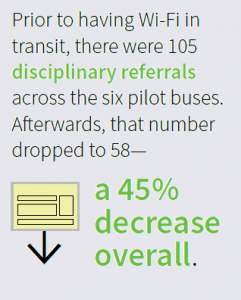The average school bus ride is 20 minutes each way, or 40 minutes per day. That might not sound like much—until you add it up over the course of a year and realize that students spend on average, 20 instructional days per year riding the bus back and forth from school to home. That’s not even counting the time they spend traveling for extracurriculars or field trips. And it’s even worse for students in rural school districts, who often face over three hours of travel time every single day.
School bus commutes are what they are, but what if students could use that time on the bus more productively? What if the bus became an extension of the classroom, where students can work on their homework, bus drivers can stay focused on driving, and parents have peace of mind knowing that their kids are safe and getting more out of that unavoidable travel time?
Providing Internet access on the school bus not only accomplishes all of these goals, it acts as the connecting component for additional bus technology. But there’s more to adding Wi-Fi to the bus than simply buying a router.
Wi-Fi on Board — What to Look for in Educational Internet for Students
The school bus is the first interaction students have with school in the morning and the final interaction at the end of the day. Providing students educational Wi-Fi access not only gives all students a chance to work on homework, but it can help start and end the school day on a positive note. This means students should have the same Internet experience on the bus as they have at school, especially since access is provided by the school district.
It doesn’t mean the Internet should be an open free-for-all. Three elements are critical:
- Anti-Virus and Intrusion Prevention Service (IPS) to keep students safe from viruses and cyber threats
- CIPA Compliance that adheres to the Federal Communications Commission’s (FCC) Children’s Internet Protection Act, blocking obscene or harmful content
- Robust filtering to keep students on educational websites instead of non-educational streaming content that will quickly deplete data
Engaged Students Help Build School Bus Driver Retention
As students focus on schoolwork (and not the latest viral YouTube video), the disruptions on the bus also decrease, which is good for students and even better for the bus driver.
In one example, Raytown School District in Missouri saw a 45 percent decrease in disciplinary referrals from the school buses equipped with educational Wi-Fi. Raytown estimates that adding the Kajeet SmartBus™ solution to their fleet will save an estimated 112 hours of administrative time each year.
 Fewer disciplinary referrals on the school bus translates into a quieter school bus, and a quieter school bus allows drivers to focus on what matters most—driving safely, not writing referrals.
Fewer disciplinary referrals on the school bus translates into a quieter school bus, and a quieter school bus allows drivers to focus on what matters most—driving safely, not writing referrals.
Even the most skeptical Raytown bus drivers have gotten on board with Wi-Fi, especially once they discovered there’s no extra work required of them. The user-friendly system operates automatically, and students are focused and behaved.
Better behaved students and quieter buses also increase driver job satisfaction and retention, helping school districts attract (and retain) even more drivers.
Wi-Fi — The Connecting Component for Technology
With Wi-Fi on the bus, students have additional time to learn, drivers have a quieter bus, and even the technology on the school bus benefits.
From GPS to telematics to downloading camera data and more, innovative school bus technology offerings expand by the day. But a centralized device is needed to bring it all together. Wi-Fi gives school districts access to connect their technology, while saving money by connecting multiple Wi-Fi-enabled solutions in one place.
The Kajeet SmartBus powers today’s Connected Bus with filtered, 4G LTE Internet access available on six wireless carriers across North America. In addition to filtered Wi-Fi, the SmartBus includes the following solutions: GPS, Push-to-Talk (PTT), Camera Offload, Intelligent Sensors, and Telematics.
To learn more, please visit www.kajeet.net/smartbus or contact Kajeet at sales@kajeet.net.
Connect your students and your technology for a safer, quieter bus ride for all.
















